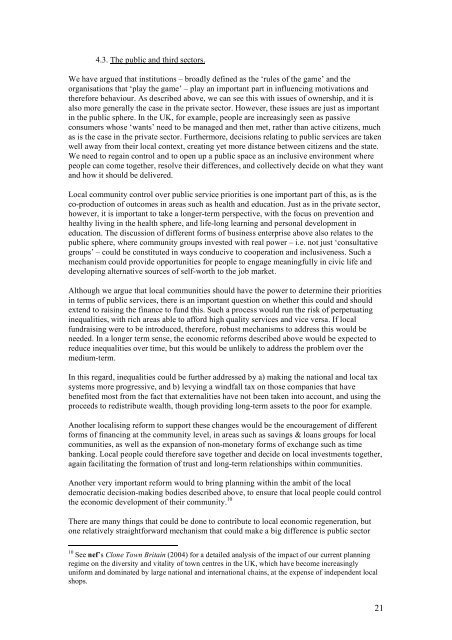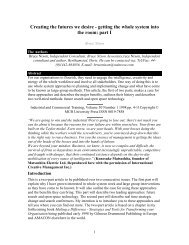From Old Economics to New Economics- Radical ... - Bruce Nixon
From Old Economics to New Economics- Radical ... - Bruce Nixon
From Old Economics to New Economics- Radical ... - Bruce Nixon
You also want an ePaper? Increase the reach of your titles
YUMPU automatically turns print PDFs into web optimized ePapers that Google loves.
4.3. The public and third sec<strong>to</strong>rs.<br />
We have argued that institutions – broadly defined as the ‘rules of the game’ and the<br />
organisations that ‘play the game’ – play an important part in influencing motivations and<br />
therefore behaviour. As described above, we can see this with issues of ownership, and it is<br />
also more generally the case in the private sec<strong>to</strong>r. However, these issues are just as important<br />
in the public sphere. In the UK, for example, people are increasingly seen as passive<br />
consumers whose ‘wants’ need <strong>to</strong> be managed and then met, rather than active citizens, much<br />
as is the case in the private sec<strong>to</strong>r. Furthermore, decisions relating <strong>to</strong> public services are taken<br />
well away from their local context, creating yet more distance between citizens and the state.<br />
We need <strong>to</strong> regain control and <strong>to</strong> open up a public space as an inclusive environment where<br />
people can come <strong>to</strong>gether, resolve their differences, and collectively decide on what they want<br />
and how it should be delivered.<br />
Local community control over public service priorities is one important part of this, as is the<br />
co-production of outcomes in areas such as health and education. Just as in the private sec<strong>to</strong>r,<br />
however, it is important <strong>to</strong> take a longer-term perspective, with the focus on prevention and<br />
healthy living in the health sphere, and life-long learning and personal development in<br />
education. The discussion of different forms of business enterprise above also relates <strong>to</strong> the<br />
public sphere, where community groups invested with real power – i.e. not just ‘consultative<br />
groups’ – could be constituted in ways conducive <strong>to</strong> cooperation and inclusiveness. Such a<br />
mechanism could provide opportunities for people <strong>to</strong> engage meaningfully in civic life and<br />
developing alternative sources of self-worth <strong>to</strong> the job market.<br />
Although we argue that local communities should have the power <strong>to</strong> determine their priorities<br />
in terms of public services, there is an important question on whether this could and should<br />
extend <strong>to</strong> raising the finance <strong>to</strong> fund this. Such a process would run the risk of perpetuating<br />
inequalities, with rich areas able <strong>to</strong> afford high quality services and vice versa. If local<br />
fundraising were <strong>to</strong> be introduced, therefore, robust mechanisms <strong>to</strong> address this would be<br />
needed. In a longer term sense, the economic reforms described above would be expected <strong>to</strong><br />
reduce inequalities over time, but this would be unlikely <strong>to</strong> address the problem over the<br />
medium-term.<br />
In this regard, inequalities could be further addressed by a) making the national and local tax<br />
systems more progressive, and b) levying a windfall tax on those companies that have<br />
benefited most from the fact that externalities have not been taken in<strong>to</strong> account, and using the<br />
proceeds <strong>to</strong> redistribute wealth, though providing long-term assets <strong>to</strong> the poor for example.<br />
Another localising reform <strong>to</strong> support these changes would be the encouragement of different<br />
forms of financing at the community level, in areas such as savings & loans groups for local<br />
communities, as well as the expansion of non-monetary forms of exchange such as time<br />
banking. Local people could therefore save <strong>to</strong>gether and decide on local investments <strong>to</strong>gether,<br />
again facilitating the formation of trust and long-term relationships within communities.<br />
Another very important reform would <strong>to</strong> bring planning within the ambit of the local<br />
democratic decision-making bodies described above, <strong>to</strong> ensure that local people could control<br />
the economic development of their community. 10<br />
There are many things that could be done <strong>to</strong> contribute <strong>to</strong> local economic regeneration, but<br />
one relatively straightforward mechanism that could make a big difference is public sec<strong>to</strong>r<br />
10 See nef’s Clone Town Britain (2004) for a detailed analysis of the impact of our current planning<br />
regime on the diversity and vitality of <strong>to</strong>wn centres in the UK, which have become increasingly<br />
uniform and dominated by large national and international chains, at the expense of independent local<br />
shops.<br />
21



